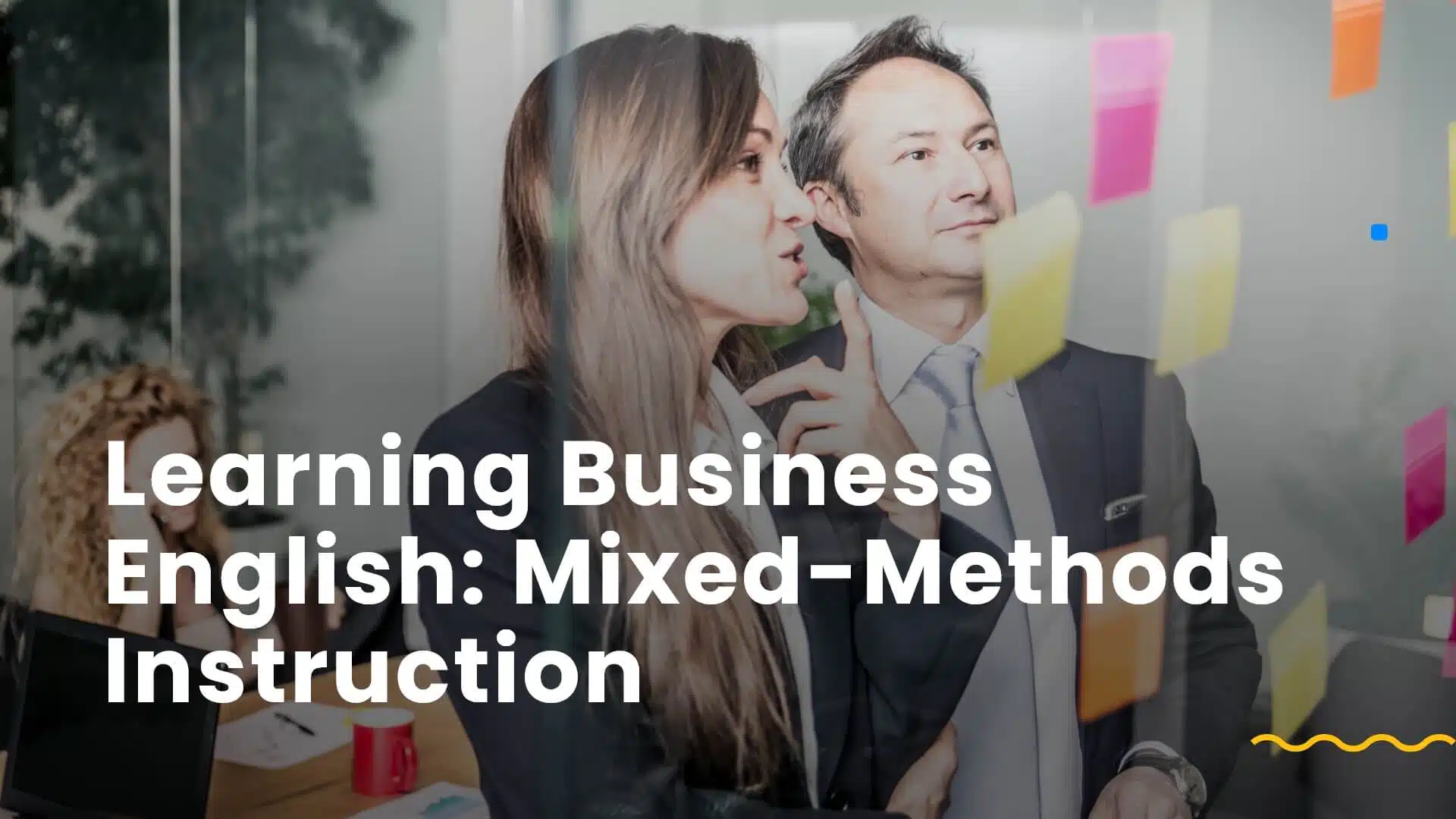English is the lingua franca for international business transactions in our interconnected, globalized economy. One of the most important aspects of a corporate language program is the effective use of Business English learning methodologies.
Some corporate language-learning program providers claim to possess the “best” method to teach English, but learning a language is a challenging process, impacted by a variety of factors. Students in corporate language programs are learning English for job-specific tasks, requiring instructional practice that will prepare them for using English on the job. When it comes to business English learning methodologies, there is no one-size-fits-all.
Let’s first look at the complexities of Business English. Then we’ll dive into the many methodologies that support the needs of Business English learners.

What is Business English?
Business English is part of the general category of English for Special Purposes (ESP). ESP refers to all forms of specialized English that professionals must master to interact with other professionals at the international level. It includes the language of academia, economy, medicine, technology, etc., just to mention a few. What are the particulars of Business English? What needs should a Business English course fulfill? Keep in mind the following points when considering a corporate language partner:
- The primary consideration is the learner’s professional field. What kind of lexicon does the learner need to acquire to perform their job-specific tasks?
- Another essential element is an understanding of international business etiquette, with knowledge of the local culture. Because business transactions are an eminently social type of interaction, communicating correctly and according to accepted parameters is very important to establish long-lasting relationships. A good Business English program will address not only vocabulary and grammar but also cultural issues.
- Business English learners have a specific learner profile that differs from other English learners. As adults, they may experience greater challenges than younger students in learning a second language.
- Limited time: While they are usually motivated and have clear goals in mind, they also have limited time and many responsibilities. They need an efficient learning approach that uses time to their maximum benefit.
- Feelings of self-consciousness: From a psychological perspective, professionals are aware of their social status and public image. Thus, they tend to be more self-conscious than younger students. This may create a reluctance to speak when they don’t feel confident enough to avoid the embarrassment of expressing themselves poorly in English.
- Higher stakes: It is also worth mentioning that the stakes are very high for businesspeople, as language mistakes in a business context can lead to poor outcomes.
- The best programs for Business English foster language proficiency for the job-specific tasks of the learner, but also soft skills like creativity, collaboration, communication, and critical thinking.

Best methodologies and practices to learn Business English
An effective Business English teaching method must adopt a communicative, hands-on, and interactive approach. This is the best approach to ensure that Business English students are personally engaged and get enough practice in a limited time. Also, consider the learner profile of Business English learners outlined above. The best programs for Business English take into account individual students’ needs, such as their specific learning goals and current English language level. A reliable Business English program will conduct a needs analysis of each learner to inform instruction.
A good Business English program will also evaluate time restrictions, the age factor, and the psychological elements that may influence learners and develop solutions to produce the best learning outcomes.
The following are some effective Business English teaching methodologies and practices instructors may combine in the Business English classroom.
- Project-based Learning (PBL). In PBL, students work in groups to develop a project (for example, a business plan or a marketing strategy,) thereby acquiring language competency and collaborative skills. PBL is an excellent strategy to improve students’ language proficiency and soft skills like creativity, teamwork, problem-solving, and communication.
- Task-based Language Teaching (TBLT). Similar to PBL, TBLT centers around accomplishing a real-world, practical task in the target language, e.g., writing an email or making a phone call. However, while the goal of PBL is more complex and can occupy many class hours, the focus of TBLT is narrower and zeroes in on more straightforward tasks.
- Role play is an extremely useful teaching practice to simulate real-life situations and enhance students’ communication skills and vocabulary (e.g., a job interview or a business negotiation.) Once the situation for the role-play has been determined, the relevant vocabulary and grammar should be pre-taught. Students can then brainstorm and create a script together or simply improvise. Role-play can be practiced in couples or teams. Role-play can also be used to highlight how people may interact differently in a given situation depending on their culture.
- Content and Language Integrated Learning (CLIL). In this learning strategy, students learn about a subject or a topic using a second language (i.e., taking a math or art course taught in the target language). Integrating the subject with the language to convey course concepts places the L2 in context, facilitating the understanding and memorization of the L2. In Business English, CLIL can be used advantageously to teach vocabulary and grammar structures using authentic materials because the students are already familiar with business-related topics and will find the understanding of the vocabulary relatively simple once it is placed in context.
- Blended learning, aka Hybrid learning, is a teaching strategy that combines synchronous (in-class) and asynchronous (outside-class) learning. Blended learning is common in online courses where students work with a teacher, and then complete skill-building practice activities or homework independently.
Blended learning has several advantages for Business English students.- It allows them to practice all four language skills (speaking, listening, reading, and writing.) While speaking and listening are best practiced during class with the instructor, students can work on reading and writing tasks on their own time and subsequently receive the teacher’s feedback.
- Students can also pre-learn some concepts and vocabulary and then practice them during class.
- Blended learning requires students to take responsibility for their learning and makes the time spent in class more productive. For professionals who are always pressed for time, blended learning is a time-saving and effective practice.
- Flipped classroom. In the flipped classroom, students receive class materials that will be taught in class in advance. According to The Derek Bock Center for Teaching and Learning at Harvard University, “A flipped classroom is structured around the idea that lecture or direct instruction is not the best use of class time. Instead, students encounter information before class, freeing class time for activities that involve higher order thinking.” It’s easy to see how this methodology can benefit Business English learners.
- Language apps and games. The last two decades have seen a huge expansion in language apps, mobile or computer programs that facilitate the learning of languages. Although language apps can’t replace live interaction with a teacher, they can assist both teachers and students by providing additional practice opportunities.

To ensure your program remains effective, regular audits should be conducted, including analysis of training methods. Read about best practices for conducting a language training program audit.
Effective Business English instruction will use a mixed-method approach
Contrary to some claims, when it comes to Business English, there is not just one methodology to teach this specialized form of English. A mixed approach that makes use of multiple methodologies is much more effective. Teachers can use PBL and TBL to help students to master language competencies, solve real problems, and accomplish real-life tasks while fostering soft skills like communication and collaboration. CLIL is a helpful methodology to teach vocabulary and grammar structures using authentic materials relevant to professionals. Blended learning and the flipped classroom are both useful strategies to optimize time usage, while games and language apps offer additional practice opportunities outside of class. Be sure to choose a language program partner with expertise in delivering relevant, effective Business English language teaching methodologies so your company language students will master the Business English skills they need to be successful.










